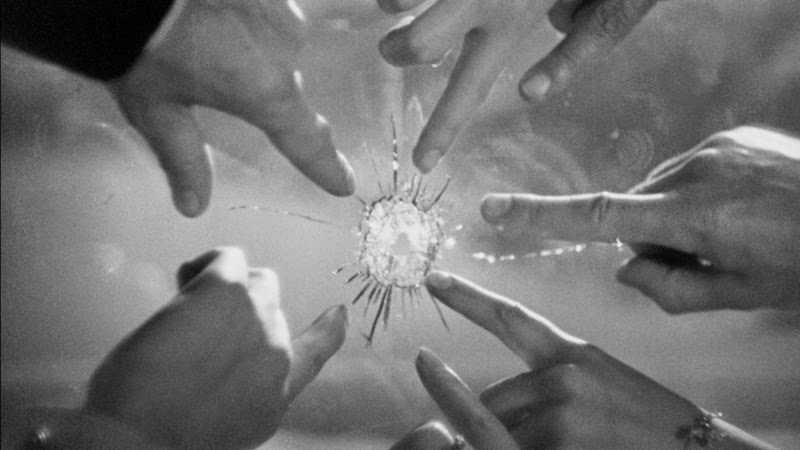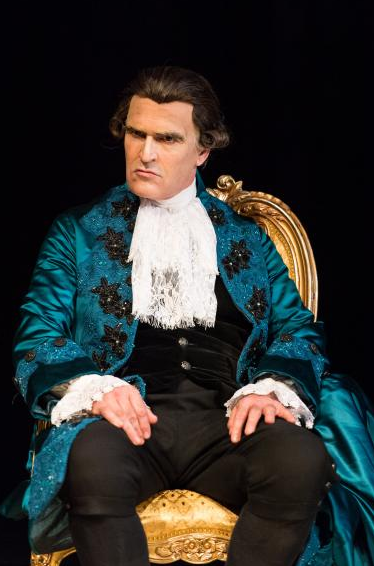Once again I find myself in a Revival week... two shows I have seen before, but which did I enjoy more this time out?
The Menier Chocolate Factory has revived FORBIDDEN BROADWAY again, the theatre where it was last revived in 2009. I missed that but made sure I saw this one as the intimacy of the Menier would suit this show well and it did, suggesting the cabaret atmosphere that was the original birthplace of the satirical show 32 years ago.
The brainchild of Gerard Alessandrini, FORBIDDEN BROADWAY takes a not too-savage swipe at current theatre shows as well as personalities past and present. I have seen the show a few times before: in New York in the late 1980s, at it's first London incarnation in 1989 when it flopped at the Fortune and a later 1999 revival at the Jermyn Street Theatre which featured the great Christine Pedi from the NY version who as Liza Minnelli picked on me! That's what you get for sitting in the front row.

The current show was enjoyable but at the end I was left oddly unsatisfied. It might have been because I am over-familiar with a good portion of the material thanks to past visits or listening to the off-Broadway cast recordings. The MISS SAIGON number is twenty years old while the afore-mentioned Liza number, Chita Rivera-Rita Moreno spat duet, the Sondheim "Into The Woods" song, the main section of LES MISERABLES and "Fugue For Scalpers" are all aged 23! Yes, to newcomers, these will be new but by the look of most of the audience I suspect most ot them knew the songs.
Also - and not for the first time - some of the audience were *profoundly* irritating as they BELLOWED with laughter at the smallest, weakest pun as if to say "I GET this joke, you don't but I do because I know what they are referring to." God save me from show-queens. For the show to actually have a bit of real bite it would be nice if Alessandrini wrote a song about his audience.
When you have been writing parodies for 32 years you can pull readymade numbers out of the trunk to cover any revival that might be playing so a recent PAJAMA GAME Broadway production can be dusted down for our current one. Is that another reason that I was less excited? That there is obviously so little difference between London and Broadway? Surely there should have been a number ripping up STEPHEN WARD to say nothing of FROM HERE TO ETERNITY.
As with any revue, you can comfort yourself that if you are landed with a duff number then there will be another along in a minute, but some definitely outstayed their welcome - a LuPone/Patinkin number seemed to last forever, a MAMMA MIA skit was negligible, an Angela Lansbury number seemed rather lame, the ONCE pisstake outstayed it's welcome - and is it really necessary to have two Idina Menzel numbers?
What I DID enjoy however were the whirlwind performances of the four cast members: Anna-Jane Casey - who I saw at my first-ever Menier visit (nine years ago!) in SUNDAY IN THE PARK WITH GEORGE - was great fun as the shrieking Menzel "defying subtlety" as well as a bored Éponine in LES MIS and even as Frankie Valli putting the boot into JERSEY BOYS; Sophie-Louise Dann gave me the biggest laugh of the night with an on-the-money Elaine Paige as well as a gurning Mme Thénardier in LES MIS - well aware that the role isn't funny while playing to half-empty houses.
Damian Humbley was huge fun as LES MIS' long-suffering Jean Valjean bemoaning "It's Too High", a demonic Miss Trunchbull and as a swift-tongued Rafiki in THE LION KING while Ben Lewis scored as Willy Wonka welcoming us to CHARLIE AND THE CHOCOLATE FACTORY's "Show Of No Imagination" and as the perpetually bored Guy in ONCE. They also worked well together as MISS SAIGON's over-amplified soldiers and as the stars of THE BOOK OF MORON.
The last number raised an interesting conundrum - how do you satirise what in itself is a satire on the Broadway musical? The show also addressed this in a SPAMALOT skit where they said that show had stolen from them. Where does a satirical show go when the shows themselves are becoming self-reverential? A special mention must go to the inexhaustible Joel Fram on piano.
Onto the Guildhall School of Drama and Music where the final year students have been appearing in a production of the sadly little-seen musical GRAND HOTEL.
It's been 6 years since I last saw a Guildhall production which is a shame as it's always interesting to see if you can spot which student may go on to success. The last production I saw was CITY OF ANGELS and, of the four that I picked out, only Gwilym Lee appears to have gone on to major success, winning the Ian Charleston award for his performance as Edgar in KING LEAR at the Donmar as well as appearing as a regular in MIDSUMMER MURDERS. Oddly enough CITY OF ANGELS beat GRAND HOTEL to the 1990 Tony Award to Best Musical!
GRAND HOTEL had a very stuttering genesis. Vicki Baum wrote her original novel in 1928 then adapted it into a play in 1930 which, in translation, played on Broadway until 1931. The year after saw the release of the classic MGM film which won the Best Film Academy Award that year.
Amazingly that was it's only nomination, it's stellar cast were all overlooked: Greta Garbo as Grushinskaya the fading ballerina, John Barrymore as the down-on-his-luck Baron, Lionel Barrymore as Kringelein the dying bookkeeper, Wallace Beery as Kringelein's former employer Preysing and Joan Crawford as Flaemmchen the ambitious typist.
In 1958, writer Luther Wright and song-writing team George Forrest & Robert Wright followed up their KISMET hit by choosing to musicalize GRAND MUSICAL, retitled AT THE GRAND. Berlin 1928 became present-day Rome, the ballerina became an opera singer (so KISMET star Joan Deiner could be cast) and Paul Muni was cast as Kringelein. Characters were ditched so Muni's role could be expanded and it opened in 1958 on the West Coast. Muni however felt that the director Albert Marre (who was also Deiner's husband) was favouring her over him and refused to re-sign for Broadway and the show closed.

30 years later, the original writers tried again by offering it to the successful director/choreographer of NINE and MY ONE AND ONLY Tommy Tune. His concept was to make the show more streamlined, more thematic and to play without an interval. The original team refused to accept his changes so Tune fired them and brought in NINE composer Maury Yeston to rewrite their songs and add several of his own. The book was rewritten by Peter Stone who refused to take a writing credit.
Tune's sleek production ran on Broadway for nearly 2
1/2 years and won Tony Awards for Tune's direction & choreography, the set & costume design and Michael Jeter's scene-stealing Kringelein. Still smarting from Tune sacking them, Forrest & Wright blocked the cast album for over two years but this ended in tragedy when David Carroll, who had originated the role of the Baron, died from a pulmonary embolism in the recording studio. His replacement Brent Barrett sang on the album instead but Carroll was represented by a live track from his cabaret show.

Barrett played the Baron when I saw it in 1992 at the Dominion Theatre when Tune's production opened with Lilianne Montevecchi reprising her role as Grushinskaya, Lynette Perry was Flaemmchen and Barry James played Kringelein but the show closed ignominiously after only four months! The show was not produced again professionally in London until 2004 when Michael Grandage directed a thrillingly memorable production with Julien Ovenden as the Baron, Mary Elizabeth Mastrantonio as Grushinskaya, Helen Baker as Flaemmchen and Daniel Evans as Kringelein. Grandage's production won the Olivier Award that year for Best Musical Revival.
In the interim however I had seen the show again in 2000 when the Guildhall School of Music and Drama had staged a production for it's last year students' Summer show. From what I can recall I enjoyed being reacquainted with the show but none of the performances stay in the mind. That production was directed by Martin Connor - mainstay of the Guildhall productions - and he again directs this current version.
I thought this was an excellent production, adhering to Tune's tight, spare concept and thought, by and large, that the students excelled in delineating their individual roles well. Sadly Simon Haines as the cynical semi-narrator was as wobbly singing as he was on his injured leg from the War and I was surprised how several of them seemed a bit breathless at the end of their numbers... stamina, darlings, pace yourselves.
Ceri-lyn Cissone was a creditable Grushinskaya suggesting the character's desperation at her fading career well and Jay Saighal, although a trifle shaky, partnered her well as the Baron, doomed by his inate decency. Ben Hall was an agreeably sinister Preysing, he actually suggested that - similar to other characters in the piece - he is driven to extreme lengths just to survive. Rebecca Collingwood was a delightful Flaemmchen, really socking over her big solo "I Want To Go To Hollywood". As you have seen above, the role of Kringelein is the one that usually draws the most praise and Joey Phillips played him as a giddy, hypersensitive soul, maybe lacking depth of feeling but certainly playing up the pathos.
A special mention too for Emily Laing's vocally strong Raffaela, Grushinskaya's quietly devoted companion and Jordan Renzo handled Eric, the put-upon concierge's big moment at the finale with a quiet authority.
Bill Deamer has choreographed the numbers with great panache and invention, I particularly liked the ominous silent Charleston the chorus did when Flaemmchen was trapped by the lustful Preysing as well as a terrifically dramatic Bolero for the two featured dancers Leah Rolfe and Adelmo Mandia. Indeed the whole company were excellent not only in the dance numbers but also in the stylised movement throughout. Morgan Large's set and costume design also contributed to the show's success as did Richard Howell's lighting design. It's just a shame the spot operators always seemed a few beats behind.
The production kept up the sense of creeping menace that is always reminding you that the comings and goings of the rich hotel guests is happening against a growing discontented proletariat that in a few years time will catapult Germany into Hitler's waiting hands.
The evocative score with it's balance of big solo numbers and show-stopping set-pieces is always a pleasure to hear and Steven Edis' excellent musical direction was another reason i enjoyed this revival so much.





















































